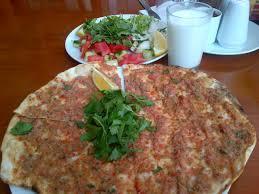'Pizza war' breaks out between Turkey and Armenia
Turkish media up in arms at Armenian efforts to promote ‘lamadjo’ - known as ‘lahmacun’ in Turkey - as a national delicacy internationally

Your support helps us to tell the story
From reproductive rights to climate change to Big Tech, The Independent is on the ground when the story is developing. Whether it's investigating the financials of Elon Musk's pro-Trump PAC or producing our latest documentary, 'The A Word', which shines a light on the American women fighting for reproductive rights, we know how important it is to parse out the facts from the messaging.
At such a critical moment in US history, we need reporters on the ground. Your donation allows us to keep sending journalists to speak to both sides of the story.
The Independent is trusted by Americans across the entire political spectrum. And unlike many other quality news outlets, we choose not to lock Americans out of our reporting and analysis with paywalls. We believe quality journalism should be available to everyone, paid for by those who can afford it.
Your support makes all the difference.The opening of two Armenian restaurants in Russia has caused a stir in Turkey over a perceived drive to brand a popular Turkish pizza-like food as an Armenian national dish.
‘Lamadjo’, as it is known in Armenian, or ‘lahmacun’ in Turkish, is a thin circular piece of dough topped with minced meat or lamb, tomatoes, parsley and spices which is then baked, and is claimed as a national foodstuff by both countries.
The seemingly innocuous restaurant openings - reported in a Turkish newspaper earlier this month - have caused outrage in Turkey, leading to a spate of media coverage and even television shows explaining why the dish is Turkish and not Armenian, al-Monitor reported.
Relations between the neighbours are notoriously fragile thanks to Turkey’s continued denial of the historically accepted 1915-1923 Armenian Genocide - and diplomatic channels between the two do not officially exist.
It’s not the first time food has caused diplomatic tensions between Ankara and Yerevan, either: Turkey was outraged when ‘lavash’, a tortilla like flatbread, was described on Unesco’s List of the Intangible Cultural Heritage of Humanity as “an expression of Armenian culture” in 2014.
The decision led to protests in Turkey, Azerbaijan, Iran, Kyrgyzstan and Kazakhstan, all of whom claimed it was a regional rather than an Armenian food. The issue is still on the menu at next month’s Intergovernmental Committee for the Safeguarding of Intangible Cultural Heritage, which will be hosted by Unesco in Addis Ababa, Ethiopia.
Armenia is not the only country Turkey has been at odds with over food in the past. Culinary spats born of deep historical tensions - including wars and forced movement of people - have led to ‘trademark wars’ with both Cyprus and Greece over halloumi, olives and baklava too, al-Monitor says.
Lehmacun or lamadjo is also popular in Israel, Lebanon and Syria.
Join our commenting forum
Join thought-provoking conversations, follow other Independent readers and see their replies
Comments